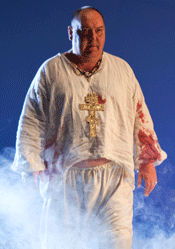Yet Schumann could write dramatic music as the much-loved Overture demonstrates, and the music in the Overture infuses the opera. His songs prove how well he could write for voice. His range as composer was wider than Wagner’s, and he was formidably well-read. What might Schumann have achieved had he continued writing after the age of 45?
UCL Opera is an unusually adventurous company. Since 1951 it has staged no less than 19 world or British premieres, and last year staged Ernest Bloch’s Macbeth . Next year, they’re planning Weber’s Die drei Pintos (completed by Mahler). Because UCL Opera does repertoire where there’s little entrenched performance tradition, its approach can be fresh and imaginative.
The original folk tale on which Genoveva is based dates back to the Middle Ages. Indeed it’s the basis of stories like Snow White, for in legend, Genoveva lived in the forest, protected by animals and by her virtue. Significantly, though, Schumann rejected the medieval concept, choosing instead to base his opera on Friedrich Hebbel’s more psychological drama, published only four years previously. Schumann wanted a “modern” take on the story. As Hebbel said “Any drama will come alive only to the extent that it expresses the spirit of the age which brings it forth”.
Schumnann’s Genoveva focuses on fundamentals — good versus evil, integrity versus deceit, the individual against the mob. Such concepts apply just as much today as they did in Schumann’s time. Its basis is the dynamic between Golo and Genoveva, who isn’t as passive as the legend would have. This gives the opera inherent drama and energy, which a really good performance can bring out.
Schumann’s orchestration is colourful. Genoveva and Seigfried have just married, but he’s going off to war. Glorious trumpet fanfares, woodwind and drums depict the excitement of battle. Alone, and isolated, Genoveva’s music is tender, heightening her confrontations with Golo and the baying mob. Later, when Drago’s ghost appears, Schumann’s dark, gloomy textures would have evoked, to his audience, the Wolf Glen scene in Weber’s Der Freischütz.
There’s plenty of incident in this narrative - a rape, mob violence, murder and of course the ghost and the witch. The sharpness of the German original is muted in English. Although the translation is by David Pountney, it’s clumsy and doesn’t adapt well to the musical line. However, it’s unrealistic to expect a largely student cast to sing idiomatically in a foreign language, and audiences might justifiably complain if they don’t know the libretto.
Perhaps, too, the drama might have been much more pointed if the set wasn’t quite so self-consciously medieval. Although the story is supposed to happen at the time of Charlemagne, Schumann (and Hebbel) quite explicitly understood the setting as allegory for universal concepts. Yet again, though, it’s asking too much of a production like this to be too ambitious. Audiences who don’t know the opera need to be guided into it gently.
What was good about the direction (Emma Rivlin) was that it didn’t gloss over the violence. The rape scene is graphic. Drago is beaten to death by the mob, whipped into frenzy by Golo’s accusations. Later Balthasar and Caspar (Simon Hall and Dan Hawkins) take yobbish delight in humiliating Genoveva. The fight scenes were well choreographed.
Unlike most student companies, UCL Opera employs professionals in key roles. In Genoveva, this makes a difference as Schumann writes the parts using the full range of each voice type. The duets and trios are so well written that the voices are clearly differentiated. Bibi Heal and Richard Rowe as Genoveva and Golo, acquitted themselves well.
Adam Green’s Seigfried was unusually impressive. He’s a natural actor, who brings depth and credibility to the part. Green’s Seigfried is sexy and charismatic. You can understand why Genoveva will suffer so much for his sake. It’s more than conventional loyalty. Also impressive was Lynton Black as Drago, the servant who is murdered as a scapegoat. When he reappears as a ghost he frightens Golo’s fellow plotter Margarethe (Magdalen Ashman) so much that she tells Siegfried the truth.
Perhaps the Bloomsbury Theatre is on the small side for an opera like this, with fairly large chorus and orchestra, at times overwhelming the voices. Yet again, that’s not really a fault. It is much more important that performers are enthusiastic and energetic, and enter into the spirit of the music. Genoveva is raw drama, after all, and a few ragged edges are a small price to pay when performances are as committed as this. That, ultimately, is the point of UCL Opera, to raise new generations to learn and care about operas that are off the beaten track.
Anne Ozorio
